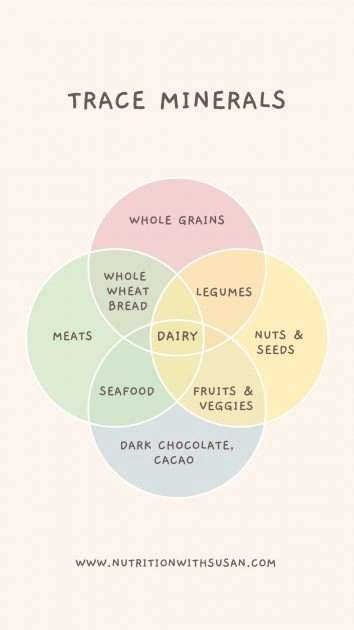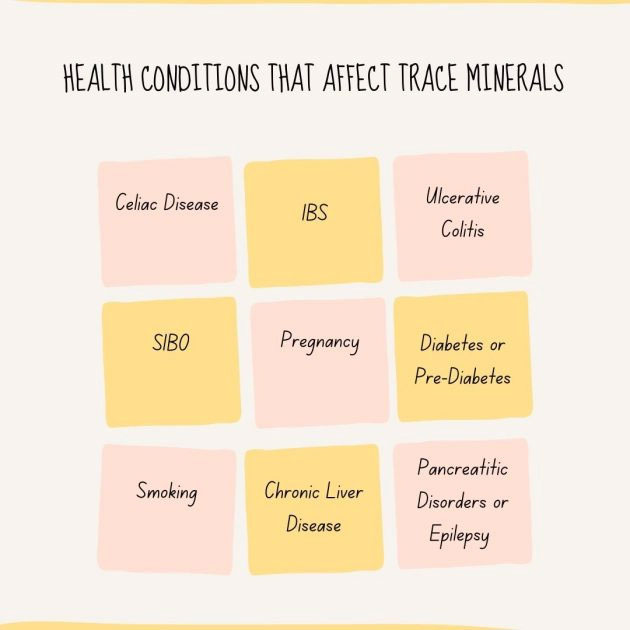INTRODUCTION
Small but mighty, trace minerals play critical roles in our bodies. When it comes to building strong bones, healthy blood sugar levels, falling and staying asleep better, enjoying healthy hair, skin, and nails, as well as overall immune health, your body needs just a trace of these nutrients daily to run better. However, food processing, personal choices, and soil health have reduced the amount of trace minerals we take in, so it’s important to assess regularly and plan your total nutrition to avoid an insufficient amount of any of these trace minerals.
HOW MUCH DO I NEED?
For starters, here are the baseline amounts of trace minerals the U. S. government currently recommends to help prevent deficiencies:
| Trace Mineral | Adult Men, Age 19+ |
Adult Women Age 19+ |
Pregnant Women |
Breastfeeding Women |
| Zinc | 11 mcg | 8 mg | 11 mg | 12 mg |
| Copper | 900 mcg | 900 mcg | 1000 mcg | 1300 mcg |
| Manganese | 2.3 mg | 1.8 mg | 2.0 mg | 2.6 mg |
| Chromium | 35 mcg | 25 mcg | 30 mcg | 45 mcg |
| Selenium | 55 mcg | 55 mcg | 60 mcg | 70 mcg |
| Molybdenum | 45 mcg | 45 mcg | 50 mcg | 50 mcg |
Remember this is a starting point, as the above amounts represent what’s needed to prevent deficiency in the general population. Don’t consistently eat the same foods day in and day out. Variety is the spice of life — it helps you avoid boredom and gives your body other nutrients that work collaboratively with trace minerals to optimize your health.
WHAT FOODS DO YOU NEED TO EAT?

Trace minerals are found in grain/flour products such as rolled oats, whole wheat products like bread, pasta, crackers, tortillas, whole grain breakfast cereals, wheat germ, quinoa, brown rice, white rice, barley, and rye.
Legumes like lentils, nuts and seeds, meats, seafood, certain vegetables and fruits, dark chocolate, raw cacao, cacao nibs, and dairy products are all good sources of trace minerals.
Some foods are fortified with trace minerals like zinc, selenium, and copper. While this can help you meet your needs, it can also raise some issues.
If you consume foods fortified with one or several trace minerals, explore whether it is because the other ingredients have been highly processed, thus removing nutrients including trace minerals.
Trace minerals work collaboratively – for example, zinc and copper – so if only one of them is fortified you could be creating or exacerbating an imbalance.
When looking at your food choices, you are more likely to get a higher amount of trace minerals in foods that are in the form closest to the way they exist in nature, from animals fed their natural diets, from those grown in soils with fewer chemical applications that can reduce the mineral presence and density, as well as soil that is nurtured with rotations of crops to replenish nutrients.
Choosing organic, regenerative organic, biodynamic foods may improve your intake of trace minerals.
DO MEDICATIONS AFFECT TRACE MINERAL NEEDS?

Some prescription antibiotics interact with zinc in the digestive tract, which can impact the absorption of both the mineral and the drug. If you’re currently prescribed these antibiotics, talk with your healthcare provider to discuss potential food or supplement and drug interactions.
If you’ve been diagnosed with Wilson’s Disease or Rheumatoid Arthritis and have been prescribed penicillamine, be sure to take any supplements that contain zinc at least a few hours before or after taking your prescription medication, as supplemental zinc can reduce the absorption and impact of the medication.
If you are currently taking thiazide diuretics (typically prescribed for high blood pressure), they may deplete your zinc levels with prolonged use by increasing excretion in urine. Be sure to discuss how to optimize your zinc status with your health practitioner if you’re taking any of these medications.
There are some prescription medications that interact with chromium. If you’re taking insulin or metformin, chromium may impact insulin sensitivity, and taking supplemental chromium may increase your risk of hypoglycemia. Additionally, supplemental chromium picolinate may impact the efficacy of levothyroxine in the treatment of hypothyroidism. If you are currently prescribed insulin, metformin, or levothyroxine, discuss your supplementation routine with your doctor.
If you are HIV + and taking antiretroviral therapy atazanavir (Reyataz) and ritonavir (Norvir), supplemental zinc may impact the efficacy of these prescriptions if taken at the same time. Be sure to discuss your supplementation routine with your provider to prevent any food/supplement drug interactions.
Birth control pills can interfere with the absorption of selenium and zinc. If you are taking or have taken oral contraceptives for any length of time make always advise your practitioner who may then choose to do further evaluation of your current trace mineral status.
Selenium may have an effect on certain blood thinners/anticoagulants and select chemotherapy drugs. If you are currently taking these medications or being treated with chemotherapy, it’s recommended that you avoid supplementing with selenium.
HEALTH CONDITIONS THAT MAY AFFECT TRACE MINERALS

If you have been diagnosed with specific digestive conditions such as Celiac Disease, Ulcerative Colitis, SIBO, and IBS or if you regularly experience digestive disturbances such as diarrhea, constipation, bloating, and reflux, you may have an increased risk of insufficient levels of trace minerals.
Trace minerals play an essential role in the conception and sustaining of a healthy pregnancy as well as for the health of the mom and the baby following birth.
Chromium helps to support healthy blood sugar metabolism and glucose sensitivity. In persons with diabetes, pre-diabetes, and insulin resistance, it is beneficial to ensure you are meeting your body’s current needs for chromium.
Smoking affects your body’s ability to absorb and use trace minerals. “Cadmium, naturally found in tobacco, decreases the bioavailability of selenium and acts antagonistically to zinc, a cofactor for the antioxidant enzyme, superoxide dismutase.”
Chronic liver disease can impact your body’s ability to process and eliminate manganese. If you have chronic liver disease, discuss your diet with your dietitian to ensure that you are consuming a safe amount of manganese in your diet. Epilepsy and pancreatic disorders may also affect your manganese levels.
CONCLUSION
Although you only need a trace amount of these nutrients, they are a vital part of your better nutrition plan. Are you meeting your trace mineral needs? If you’re not quite sure, ask me how you can find out! I’d love to work with you to develop your personalized nutrition plan.

